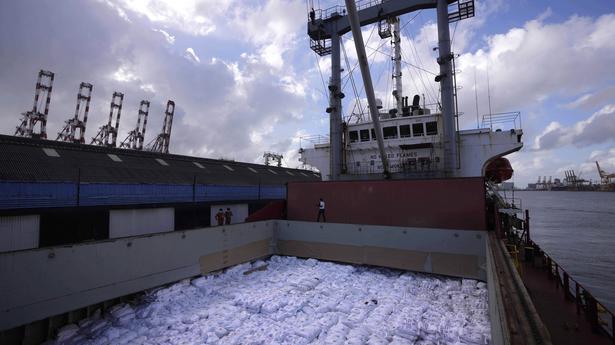
Willing to work with India to help Sri Lanka, says China
The Hindu
New Delhi has made great efforts to help Colombo: Beijing
“Recognising” the Indian government’s “great efforts” in supporting Sri Lanka, China on Wednesday expressed willingness to work with India and the international community to help Sri Lanka tide over its crushing economic crisis.
In a media briefing held in Beijing, Chinese Foreign Ministry spokesperson Zhao Lijian outlined the Chinese government’s recent humanitarian assistance totalling 500 million RMB (approximately $73 million) to Sri Lanka. “We also noted the Indian government made great efforts in this aspect. We recognise that, and we are willing to work with India and other members of the international community to help Sri Lanka and other countries with difficulties to help these developing countries to get through this situation,” he said.
China’s official acknowledgement of Indian assistance to Sri Lanka — totalling $ 3.5 billion this year by way of currency swaps, loan deferments, and credit lines — is significant, coming amid a well-known geopolitical contest between the two powers in Sri Lanka. Earlier this year, China expressed disappointment over Colombo replacing a proposed Chinese energy project in three islands off the northern Jaffna peninsula with an Indian project. “Interrupting a project won through a competitive bidding process [backed by the Asian Development Bank] does not send out a good message for foreign investors looking at Sri Lanka,” the Chinese Ambassador in Colombo told the media in March. Echoing the sentiment on Wednesday, the Chinese official observed: “We believe Sri Lanka will also work actively to protect the legitimate rights and interests of foreign investors and partners, and also uphold the stability and credibility of its financing and business environment.”
China is one of Sri Lanka’s top two bilateral creditors, along with Japan. Chinese loans, however, make up about 10% of the island’s external debt that is dominated by market borrowings accounting for nearly half of the total foreign loans. In April 2022, Sri Lanka decided to pre-emptively default on all its foreign debt of about $50 billion to cope with a foreign exchange crunch that left the country with no dollars to pay for even essential imports.
Following Colombo’s announcement on its debt default, Chinese institutions “immediately had discussions with Sri Lankan side to properly resolve the debts”, Mr. Zhao said, expressing hope that “Sri Lanka will work actively with China to discuss the appropriate settlement”. Further, China “stands ready to work with relevant countries and international financial institutions to continuously help Sri Lanka in dealing with the current circumstances and easing its debt burden to achieve sustainable development”, the official said, amid speculation in Colombo over China’s possible response to a debt restructure programme prescribed by the International Monetary Fund (IMF).
Colombo has sought the IMF’s help on debt restructuring and economic revival. Prime Minister Ranil Wickremesinghe, who spoke to the IMF chief on Tuesday, urged the Fund’s team to visit Sri Lanka “as soon as possible” to finalise the staff-level agreement, his office said. Sri Lanka must restructure its debt owed to private creditors and bilateral lenders.
Sri Lanka, which needs $6 billion to wade through the next six months, has also sought help from China and Japan. As part of its assistance during the pandemic, China extended $2.8 billion in assistance to Sri Lanka. But Colombo has raised concern over not being able to access the swap, that is contingent on Colombo showing adequate foreign reserves for three months. “We have not had foreign exchange reserves for three months since the loan was taken…We have requested the Chinese government to consider removing that condition from the agreement that has been signed with them,” Mr. Wickremesinghe told Parliament on Wednesday.

The 29th edition of the Conference of Parties (COP29), held at Baku in Azerbaijan, is arguably the most important of the United Nations’ climate conferences. It was supposed to conclude on November 22, after nearly 11 days of negotiations and the whole purpose was for the world to take a collective step forward in addressing rising carbon emissions.










